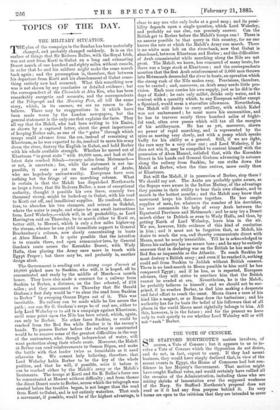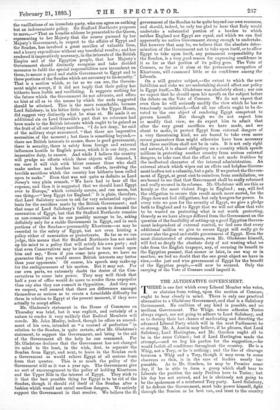THE VOTE OF CENSURE.
SIR STAFFORD NORTHCOTE'S motion involves, of course, a Vote of Censure ; but it appears to us to involve a Vote of Censure which the Opposition do not desire, and do not, in fact, expect to carry. If they had meant business, they would have simply declared that, in view of the recent events in Egypt, the House of Commons had lost confidence in her Majesty's Government. That motion might have caught Radical votes, and would certainly have rallied all the enemies of the Administration, including those who are raising shrieks of lamentation over the supposed weakness of the Navy. Sir Stafford Nortlacote's proposal does not read as if it had any firm purpose behind it. Its very terms are open to the criticism that they are intended to cover the vacillations of an irresolute party, who can agree on nothing bat an indeterminate policy. Sir Stafford Northcote proposes to move,—" That an humble address be presented to the Queen, representing to her Majesty that the course pursued by her Majesty's Government, in respect to the affairs of Egypt and the Soudan, has involved a great sacrifice of valuable lives, and a heavy expenditure without any beneficial results ; and has rendered it imperatively necessary, in the interests of the British Empire and of the Egyptian people, that her Majesty's Government should distinctly recognise and take decided measures to fulfil the special responsibilites now incumbent on them, to assure a good and stable Government to Egypt and to those portions of the Soudan which are necessary to its security." That is a motion which, so far as we can see, the Government might accept, if it did not imply that their policy has hitherto been feeble and vacillating. It suggests nothing for the future which the Government do not advocate, and offers no hint at all as to the means by which the ends suggested should be attained. This is the more remarkable, because Lord Salisbury, in his bitter little speech in the Upper House, did suggest very distinctly what he aims at. He made it an additional sin on Lord Granville's part that no reference had been made to the British interests which ought to be gained as the fruit of all our military sacrifices. "I do not deny," he said of the military steps announced, " that these are imperative necessities of the moment ; but there is something beyond,— there are British interests to secure, there is good government, there is security, there is safety from foreign and external influences hostile to English power, which it is our duty, our imperative duty, to ensure. And while I believe the country will grudge no efforts which these objects will demand, I am sure it will visit with bitter censure those who shall make useless and bootless but vast efforts, involving the terrible sacrifices which the country has hitherto been called upon to make." Even that was not quite as definite as Lord Jersey's very plain remark, " We have had to bear all the expense, and then it is suggested that we should hand Egypt over to Europe," which certainly means, and can mean, but one thing,—" keep Egypt for England." It is plain, therefore, that Lord Salisbury means to ask for very substantial equivalents for the sacrifices made by the British Government ; and that some of Lord Salisbury's followers mean to demand the annexation of Egypt, but that Sir Stafford Northcote remains as non-committal as he can possibly manage to be, asking definitely only for a stable Government in Egypt, and in such portions of the Soudan—presumably Khartoum—as may be essential to the safety of Egypt, but not even hinting a policy either of annexation or protectorate. So far as we can judge, this means that Sir Stafford Northcote has not made up his mind to a policy that will satisfy his own party ; and that even Conservatives may be inclined to turn round upon him and say, ' Even if you come into power, we have no guarantee that you would secure British interests any better
than your opponents.' Of course, his speech may make-up for the ambiguousness of his motion. But it may not. For our own parts, we extremely doubt the desire of the Conservatives to come into power. They may well think that half a year of office would do more to render them unpopular than any sins they can commit in Opposition. And they are, we suspect, well assured that there are differences amongst themselves so serious as to create a formidable difficulty for them in relation to Egypt at the present moment, if they were actually to accept office. Mr. Gladsone's statement in the House of Commons on Thursday was brief, but it was explicit, and certainly of a nature to render it very unlikely that Radical Members will secede. Mr. John Morley, indeed, though he offers an amend ment of his own, intended as " a counsel of perfection " in relation to the Soudan, is quite certain, after Mr. Gladstone's statement, to support the Government, and bring to the aid of the Government all the help he can command. For Mr. Gladstone declares that the Government has not changed its mind in the least, in the wish, first, to separate the
Soudan from Egypt, and next, to leave in the Soudan such a Government as would relieve Egypt of all serious fears
from that quarter. This is as much the policy of the Government still as it was a year ago. The Government give no sort of encouragement to the policy of holding Khartoum and the Upper Nile in the interest of Egypt. They stick to it that the best possible thing for Egypt is to be rid of the Soudan, though it should rid itself of the Soudan after a fashion which would not entail needless dangers. We entirely support the Government in that resolve. We believe the fit government of the Soudan to be quite beyond our own resources, and should, indeed, be only too glad to hear that Italy would undertake a substantial portion of a burden to which neither England nor Egypt are equal, and which we can find apparently no native Government strong enough to undertake. But however that may be, we believe that the absolute determination of the Government not to take upon itself, or to allow Egypt to take upon itself, any permanent responsibility for the Soudan, is a very good reason for expressing confidence in it so far as that portion of its policy goes. The Vote of Censure, so far as it aims at the permanent occupation of Khartoum, will command little or no confidence among the Liberals.
On a still greater subject,—the extent to which the new liabilities and risks we are undertaking should affect our policy in Egypt itself,—Mr. Gladstone was absolutely silent ; nor can we expect that he should open his mouth on the subject before the debate on the Vote of Censure. We do not expect that even then he will seriously modify the view which he has so tenaciously maintained,—that all our efforts ought to be devoted to the one object of rendering Egypt competent to
govern herself. But though we do not expect him to modify that view, we do expect him to admit that after the very great sacrifices we have made, and are about to make, to protect Egypt from external dangers of a very threatening kind, we are bound to take even more secure guarantees than might otherwise have been necessary that these sacrifices shall not be in vain. It is not only right and natural, it is almost obligatory on a country which spends millions in protecting another country from serious external dangers, to take care that the effort is not made fruitless by the ineffectual character of the internal administration. An external attack which wipes out an effete and helpless Government is often not a calamity, but a gain. If we protect the Government of Egypt, at great cost to ourselves, from annihilation, we are bound to see that that Government shall be really reformed and really secured in its reforms. Mr. Gladstone will see this as keenly as the most violent Jingo in England ; nay, will feel the obligation to secure this result much more sacred, for the Jingo does not feel obligations, but only hungers for power. In every vote we pass for the security of Egypt, we give a pledge both to England and to Egypt that we will not allow that vote to be wasted on protecting what is not worth protecting. Gravely as we have always differed from the Government on the question of the feasibility of setting-up a good Egyptian Government independent of external control, we feel sure that every additional million we give to secure Egypt will really go to secure also the good and stable government of Egypt. Even the most disinterested of statesmen, even Mr. Gladstone himself, will feel so deeply the absolute duty of not wasting what we take from the English taxpayer, nay, of securing its benefit to the Egyptian peasant, that sooner or later, in one way or in another, we feel no doubt that the one great object we have in view,—the just and wise government of Egypt for the benefit of the Egyptian people,—will now be secured. Only the carrying of the Vote of Censure could imperil it.



































 Previous page
Previous page